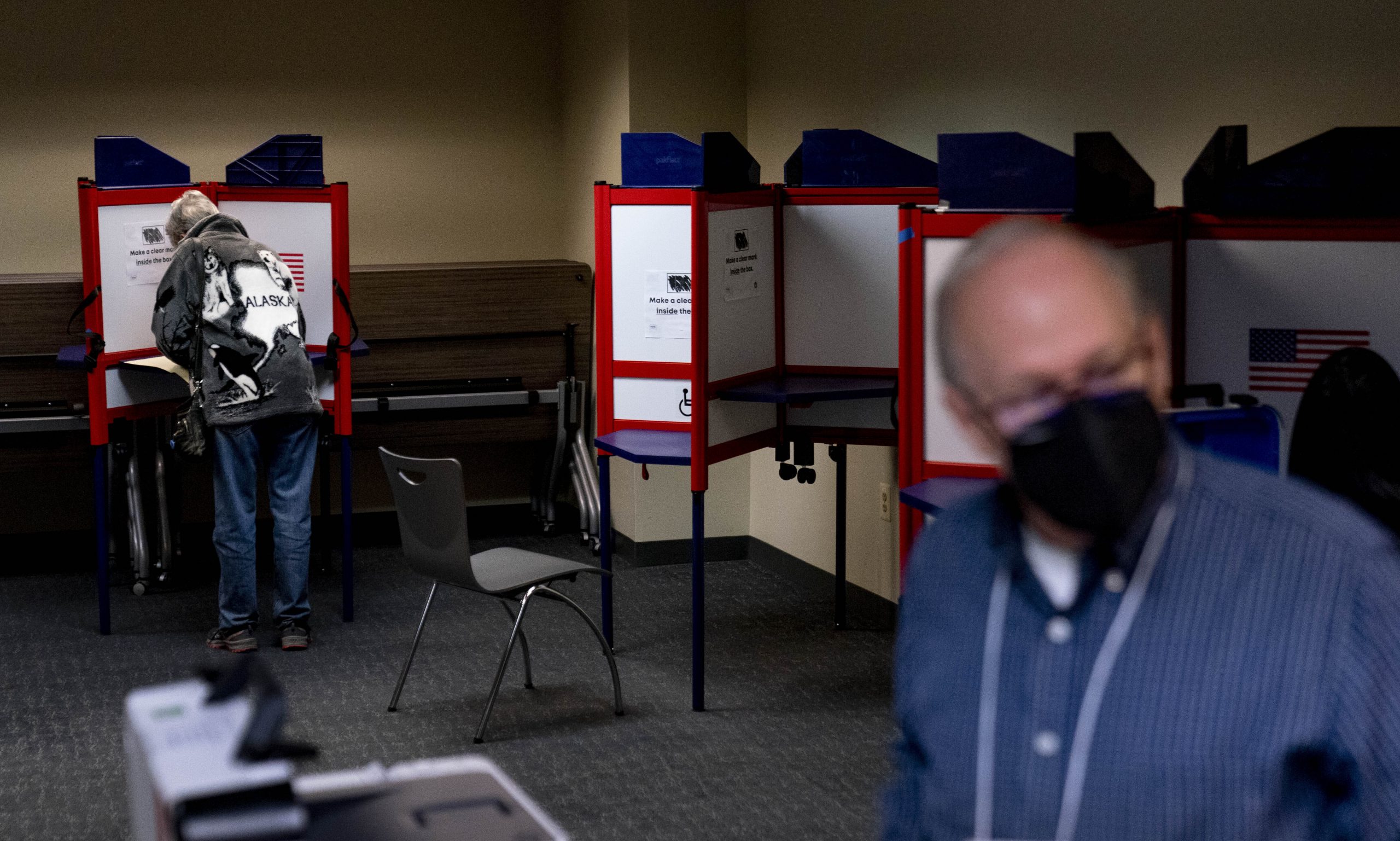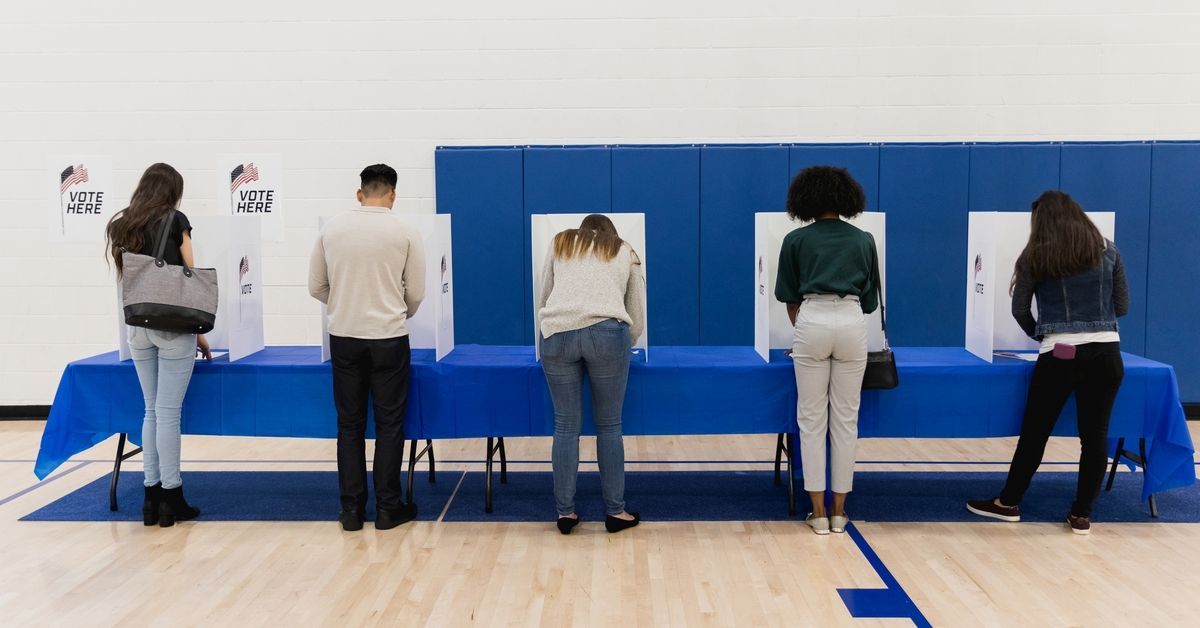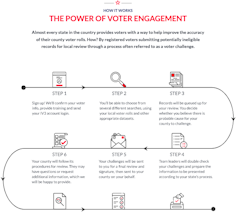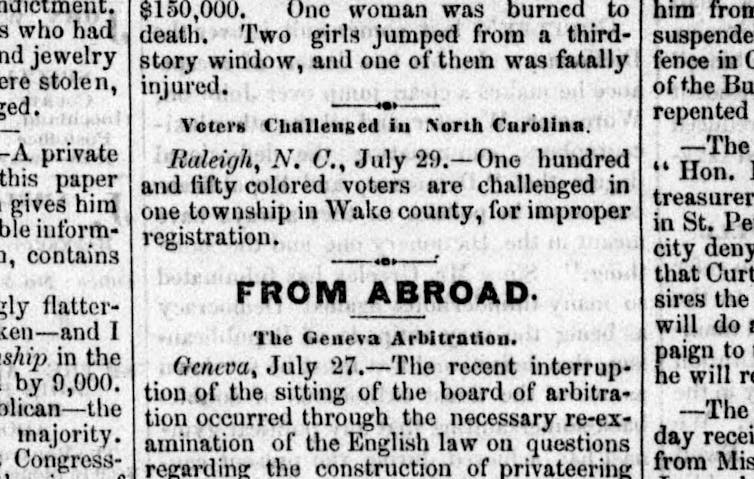Who's looking forward to the most reasonable, calmest mid-term elections in recent US history coming soon? Well apparently, not anyone officially working for the elections at the very least.

 thesoufancenter.org
thesoufancenter.org
The inevitable reaction to the predictable push...
Also;

 www.snopes.com
www.snopes.com
But will anything violent happen at all? Are these just the woke fever dreams of paranoid soros soy boy armies? Or are things going to be fine and everything is getting way better actually?

IntelBrief: Serious Concerns Over Political Violence Surrounding U.S. Midterm Elections - The Soufan Center
In the leadup to the November 2022 U.S. midterm elections, concerns are growing over threats of election-related political violence, which are spiking online. The furor began escalating following the Federal Bureau of Investigation (FBI) raiding former President Donald Trump’s residence and club
 thesoufancenter.org
thesoufancenter.org
Bottom Line Up Front
In the leadup to the November 2022 U.S. midterm elections, concerns are growing over threats of election-related political violence, which are spiking online. The furor began escalating following the Federal Bureau of Investigation (FBI) raiding former President Donald Trump’s residence and club in Mar-a-Lago, Florida in early August to retrieve classified documents that Trump took with him after leaving office. In the immediate aftermath of the raid, an anti-government violent extremist attempted to attack the FBI building in Cincinnati, dying after a shoot-out with law enforcement.
- In the leadup to the November 2022 U.S. midterm elections, concerns are growing over threats of election-related political violence, which are spiking online.
- On sites like Reddit, Parler, Telegram, Gab and Truth Social, there have been widespread calls for civil war, echoing some of the most violent rhetoric that accompanied the lead-up to the January 6, 2021, Capitol insurrection.
- Election workers are now receiving active shooter training, as election sites and offices are in the process of hardening formerly soft targets, hiring security guards, and installing bulletproof and bomb-resistant glass.
- Issues including abortion, immigration, COVID-19 vaccines, election integrity, and inflation have raised the temperature of an already hyper-partisan political climate.
One of the byproducts of years of political polarization in the United States has been the erosion of previously established norms. In late 2022, it has become normalized for Americans to talk about civil war and make politically or ideologically motivated threats of violence against their fellow citizens and longstanding U.S. institutions. As groups previously on the fringes of society—including anti-government organizations and militia violent extremists— become more common and accepted in the mainstream, those calling for calm and seeking to advance a more moderate agenda have been marginalized. Yet such violent rhetoric is not limited to once fringe militia, as government leaders have used their platforms to both stoke and pontificate their own threats of violence. In late September, former President Trump posted on his Truth Social platform that Senator Mitch McConnell had a “DEATH WISH,” in what many viewed as a threat over McConnell agreeing to a deal to the fund the government. Moreover, as some leaders spouting incendiary rhetoric increasingly invoke religious language and imagery, the potential for mainstreaming violent language and narratives – particularly to those who otherwise would condemn it – becomes alarmingly acute. The rising threat of Christian nationalism, a cultural identity that experts say is agile enough to include militia groups, QAnon conspiracists, and election deniers, often marries apocalyptic language with an aim for the U.S. to be declared a Christian nation and the government to promote a specific interpretation of Anglo-Protestantism as the country’s official culture. Some Christian nationalists have openly called for such an aim to be accomplished through civil war, to fight evil forces and restore the country to a mythical greatness of the past.
On sites like Reddit, Parler, Telegram, Gab and Trump's social media platform Truth Social, there have been widespread calls for civil war, echoing some of the most violent rhetoric that accompanied the lead-up to the January 6, 2021, Capitol insurrection. More than 900 individuals have been charged in relation to crimes committed related to that event. Yet the arrests clearly have not been the deterrent many hoped for, as online threats against elected officials continue to appear and often surge after events like the Mar-a-Lago raid or President Biden’s speech decrying “MAGA Republicans” in Philadelphia last month. Conspiracy theorists, election deniers, and purveyors of mis-, dis-, and mal-information (MDM) will seek to play an outsized role in the upcoming midterm elections, opening up opportunities for foreign actors to amplify election-related disinformation MDM narratives in an effort to foment chaos and weaken America’s image and leadership abroad.
At the heart of Trump’s disinformation campaign was the so-called ‘Big Lie’ that the election was stolen, an unfounded notion that has been dismissed by legal scholars, election officials, and state and federal judges across the political spectrum. Despite the Trump campaign’s legal losses, the narrative continues to be parroted by Trump sycophants hoping to curry favor with the former President and has resulted in catastrophic consequences. Election workers are now receiving active shooter training, as election sites and offices are in the process of hardening formerly soft targets, hiring security guards, and installing bulletproof and bomb-resistant glass, images typically reserved for countries in conflict zones. These measures are in addition to the work of the Election Threats Task Force, created in June 2021 by the Department of Justice in response to elevated levels of threats against election and poll workers. Election workers left their jobs in record numbers following the November 2020 U.S. presidential election. After Philadelphia city commissioner Al Schmidt defended the integrity of the election, he received a text message that read “You lied. You [are] a traitor. Perhaps 75 cuts and 20 bullets will arrive soon.” Other election workers throughout the country were similarly harassed and targeted for intimidation.
Issues including abortion, immigration, COVID-19 vaccines, election integrity, and inflation have raised the temperature of an already hyper-partisan political climate. In the weeks leading up to the last midterm elections in 2018, there were four separate domestic terrorist attacks in the U.S., though each had a distinct message and spanned the ideological spectrum. Politicians that run political ads with direct threats of violence, as Eric Greitens did in his infamous “RINO hunting” television ad, only serve to exacerbate the issue while attempting to legitimize political violence against opponents. At a Trump rally in Michigan recently, Marjorie Taylor Green, a Georgia Republican, said that President Biden “has declared every freedom-loving American an enemy of the state.” She went on to declare that “Democrats want Republicans dead and they have already started the killings,” an inflammatory, unsubstantiated claim many viewed as potentially an incitement to retaliatory violence. As users on social media sites continue to glorify civil war in the United States, some worry about a self-fulfilling prophecy, where the direst predictions come true, leading to heightened violence in the lead-up to, during, and aftermath of the midterm elections.
The inevitable reaction to the predictable push...
Election workers are now receiving active shooter training, as election sites and offices are in the process of hardening formerly soft targets, hiring security guards, and installing bulletproof and bomb-resistant glass, images typically reserved for countries in conflict zones. These measures are in addition to the work of the Election Threats Task Force, created in June 2021 by the Department of Justice in response to elevated levels of threats against election and poll workers. Election workers left their jobs in record numbers following the November 2020 U.S. presidential election.
Also;

Scholar: Challenges to Voters are Growing Before the Midterms – and Pose a Direct Threat to Voting Rights
On Nov. 8, the U.S. may experience a surge of voters intimidated by Election Day challenges to their right to cast a ballot.
Voters who want to cast their ballot on Election Day this November may be in for an unpleasant surprise – the very real possibility that they will be unable to vote.
That’s because any registered voter can challenge the right of another voter, or group of voters, to cast a ballot by alleging that they are not qualified to do so.
Potential challenges range from the wrong address on a voter’s registration to not being old enough to vote to having been barred from voting as a felon. Once a challenge is made, election officials have to determine whether it is valid and whether a voter should be removed from the list of eligible voters.
State and local election officials have already had an unusually busy year dealing with voting challenges. In many places, they have been flooded with them.
The Associated Press reported on Sept. 17, 2022, that in one Iowa county, election officials who had received “three voter challenges over the previous 15 years” got 119 challenges over a two-day period.
This year, Georgia has been ground zero for such efforts. Eight counties have received complaints seeking to remove 65,000 people from their lists of registered voters. In 2021, True the Vote, a self-described election integrity group, led an effort that challenged 364,000 voters across all of Georgia’s 159 counties.
Such challenges don’t happen only before Election Day; 39 states allow similar challenges to occur on Election Day itself. A video obtained by Politico shows a GOP staffer in Michigan explaining how Republicans will, the reporter writes, “install party-trained volunteers prepared to challenge voters at Democratic-majority polling places.”
The website of conservative group True the Vote features this description of an effort to use citizens to review ‘potentially ineligible records for local review through a process often referred to as a voter challenge.’Screenshot from True the Vote
The Trump Effect
In 2020, then-President Donald Trump urged his supporters to file such challenges in places where he claimed that there might be fraudulent voting.
During that year’s first presidential debate, Trump singled out Philadelphia, a longtime Democratic stronghold with a large Black population. He called on supporters to “go into the polls and watch very carefully … because bad things happen in Philadelphia. Bad things.”
The practice of citizens’ challenging others’ right to vote started long before Trump came onto the political scene. It is, in fact, older than the American republic. Throughout U.S. history, citizen voting challenges have been a tool used by people seeking to disenfranchise others and secure partisan advantage for themselves.
200 Years of Citizen Challenges
The first laws authorizing such challenges to others’ voting rights can be traced back to the American Colonies. In some of those places, the right to challenge was even written into royal charters, allowing challenges in any Colonial election.
For example, in 1742, when Rhode Island and Providence Plantations revised its charter, the changes included this provision allowing eligible voters to question the voting rights of any other person:
Soon after the American Revolution, newly formed states enacted laws giving their voters the right to challenge people who they believed had supported the British during the war. New York law allowed citizens to object to anyone voting who had “not taken an active and decisive part in favor of the United States in the present war. …”“… if any Person in this Colony shall attempt to vote in any Election within the same, who is suspected not to be qualified as above said, it shall and may be lawful for any Person to inform the Moderator, or other Person who presides at such Election, that he hath Cause to doubt, that such suspected Person hath not a good Right to vote.”
The full flourishing of this practice did not occur until after the Civil War. Suddenly confronted with the prospect that freed slaves would vote and change the outcome of elections, states in the Reconstruction South enacted voter challenge statutes.
These laws fostered a kind of vigilante justice, in which citizens could police the electoral behavior of others in the name of preventing fraudulent voting.
Such vigilantism was one tool among many to intimidate freed slaves and keep them from casting ballots on Election Day.
A brief item describing voter challenges to 150 ‘colored voters’ in The Daily State Journal of Alexandria, Va., on July 29, 1872.Library of Congress
Political Parties and Voting Challenges
Despite their tainted history, laws allowing citizens to make both preelection and Election Day challenges persisted through the 20th and into the 21st century. The Brennan Center, a progressive think tank, notes that in the early 20th century, several states reaffirmed, reenacted or refined their voter challenge laws, including Election Day challenges.
One example: In 1904, Virginia reenacted its Election Day challenge law and at the same time passed new poll tax and literacy tests for voting. Today, Virginia law says that “any qualified voter and election officers” may object to anyone’s casting a vote on the grounds that they are not legally eligible to do so.
During the 20th century, political parties promoted voting challenges.
One of the most prominent of those efforts happened during the 1981 campaign for New Jersey governor. The Republican National Committee mailed sample ballots to the homes of people in precincts with a high percentage of racial or ethnic minority voters. Voters whose sample ballots were returned as undeliverable, or because the voter had moved, were then subject to challenge.
The Democratic National Committee sued, alleging the Republicans’ effort violated the 1965 Voting Rights Act. The suit resulted in a court-approved agreement in which the Republican National Committee agreed to end this vote-challenging practice.
Before the 2004 election, the Republican Party announced another voter challenge plan. It would station 3,500 people in polling places in Democratic areas of Ohio to raise objections when Democratic voters showed up to vote. The party ultimately backed down, even though it won a court fight over its plan.
What Happens in an Election Day Challenge?
On Election Day any registered voter seeking to disqualify another person from voting must notify an election official of the desire to file a challenge. They may do so on the same grounds that are used in preelection challenges.
Such challenges raise real difficulties at the polls. In many states, challengers do not have to submit evidence to substantiate their allegations.
While voters get no advance notice that a challenge will be made, they may be required to provide documentation or swear on the spot that they are entitled to vote.
As Federal District Judge Donald Molloy said in a 2008 Montana election challenge case, “Voters might be intimidated, confused or even discouraged from voting upon receiving notice that their right to vote … has been challenged.”
And Election Day challenges put officials at polling places in a very difficult position. As the Brennan Center puts it, they are “under immense time pressure to decide challenges quickly. … As a result, they can be denied a full opportunity to thoroughly review every challenge and to verify the challenger’s allegations.” In some states challenged voters may be allowed to cast provisional ballots while the challenge is pending.
On Nov. 8, this nation may experience a surge of voters intimidated by Election Day challenges. Election officials may have to make hurried decisions. That’s a situation that threatens the very right to vote, a right that former President Ronald Reagan once called “the most sacred right of free men and women … (and) the crown jewel of American liberties.”
But will anything violent happen at all? Are these just the woke fever dreams of paranoid soros soy boy armies? Or are things going to be fine and everything is getting way better actually?
Last edited:


